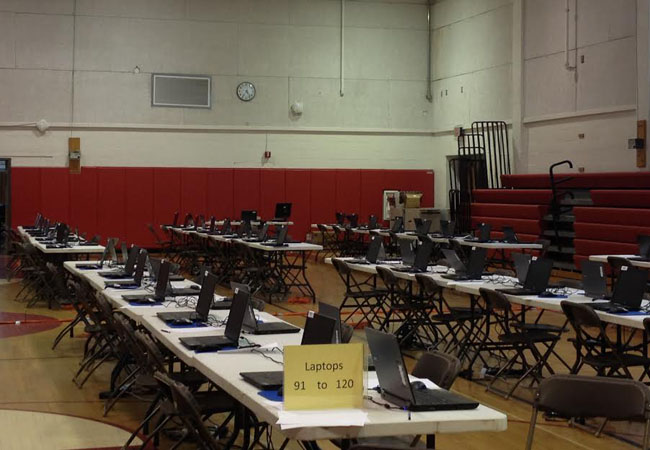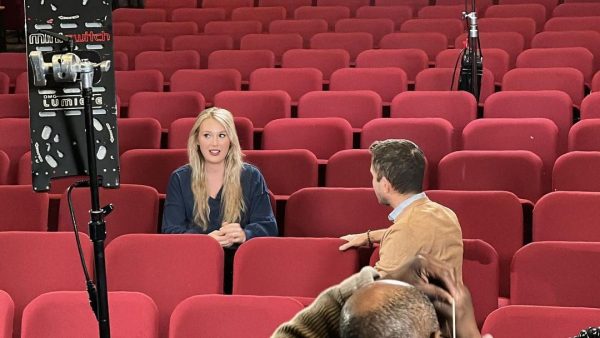SOL requirements will be lowered
Upstairs gym testing area
This year, SOL testing comes on the heels of a decision by the Virginia General Assembly to change the number of SOLs that students will be required to take.
Governor Terry McAuliffe signed a measure into law saying that students will have to take five less exams than in previous years. The number of exams for students will be lowered from 22 exams spread out from third to 11th grade, to 17 exams. All of the removed exams are being taken from the ones that students take in elementary and middle schools.
This measure, along with a recent study released by Virginia Commonwealth University, shows an increase in dislike for the standardized tests among Virginia residents. The poll was a phone survey of 800 adults in late December and early January of this year.
In the survey, seven out of ten Virginians said that increased testing hurts or doesn’t affect student performance.
The students and faculty at AHS mirror the feelings put forth in the survey.
“What does a kid really get out of the SOLs? These tests are for the state,” English teacher Julia Hanneman said. “[A student] gets something out of their class, not from taking a test. A test is an assessment, not the experience.”
“I believe that standardized testing is harmful to the student body at large because of the many negatives of it,” junior Rasel Abutaa said. “For instance, we have to take days out of class to study for things that we’ll never need in our lives and that don’t contribute to the curriculum that we’re supposed to study.”
“SOLs don’t really benefit the student body because towards the end of the year, all we are learning to do is pass the SOL, and that takes the focus away from other tests and finals that might be more important,” sophomore Amanda Adenan said.
Teachers have similar feelings about the tests that students are forced to take.
“I get the purpose of it. I get that we need to make sure across the board that everyone is meeting a certain standard,” Hanneman said. “But I think that it’s moving more towards the direction of making things more difficult than they need to be.”
This direction includes the introduction of interactive questions in 2010 as well as the higher standards introduced with them.
Opposite these changes come the changes in the number of tests by McAuliffe and the Virginia General Assembly. Some at AHS find these changes to be more beneficial to students than the previous changes.
“I think the lower number is fine, as long as the tests still cover the disciplines,” Hanneman said.
The survey also cited that 63 percent of respondents think that the state’s SOL tests put too much pressure on students, and three in four who agree that preparing for SOLs prevent teachers from covering all the important material needed.
“The tests hold both students and teachers accountable,” Hanneman said. “These tests put students in a tight spot by making them pass these tests as a graduation requirement, but teachers are also held accountable because their names go on the scores.”
AHS students feel that they are being robbed of class time that could be used to prepare for final exams.
“The SOLs really take away time that could be focused on learning more that is part of the curriculum or studying for finals,” Adenan said.
“I had an SOL on May 20, the Reading SOL, I spent 30 minutes on the test, and I got a pass advance. It was that simple,” Abutaa said. “I could have spent that time in class learning or doing homework for other classes. There are many things that I could have done that I wasn’t able to do because the SOL took up an entire class period.”
Many people think that the changes to the tests made by McAuliffe and the General Assembly are a good initiative, but not enough to really make a difference.
“I think this is a good first step, but it is not a strong enough first step,” Abutaa said. “[McAuliffe] should be pushing for more variable education and better pay for teachers.”

Jarod is a senior at Annandale High School and has been with The A-Blast for four years. Aside from being the Co-Editor in Chief, Jarod also participates...








